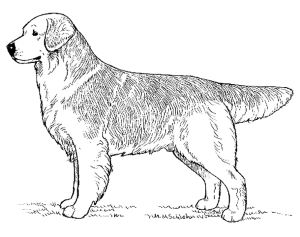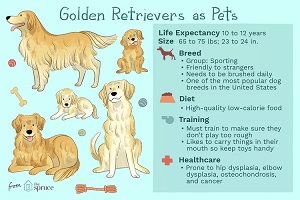The Golden Retriever is a beloved and iconic dog breed known for its friendly nature, intelligence, and beautiful golden coat. With their unwavering loyalty and versatility, Golden Retrievers have captured the hearts of dog enthusiasts worldwide.
What is the History of Golden Retrievers?
The history of the Golden Retriever can be traced back to the mid-19th century in Scotland. The breed was developed by Sir Dudley Marjoribanks, later known as Lord Tweedmouth, at his estate, Guisachan, near Glen Affric. Lord Tweedmouth had a specific goal in mind: to create an ideal gundog that excelled in retrieving game during hunting expeditions.
Around 1865, Lord Tweedmouth acquired a yellow-colored Retriever named Nous, whose lineage is uncertain. Nous was bred to a Tweed Water Spaniel, a breed that is now extinct. The resulting litter included four yellow puppies, which formed the foundation of the breed that would become the Golden Retriever.
In subsequent breedings, Lord Tweedmouth introduced Irish Setters to the bloodline to enhance the breed's beauty, Bloodhounds to improve scenting abilities, and more Tweed Water Spaniels to refine their retrieving skills. This selective breeding process aimed to create a versatile gundog that possessed an exceptional nose, a gentle mouth for carrying game, and a cooperative and trainable temperament.
The breeding program at Guisachan focused on producing dogs that were well-suited for working in the Scottish Highlands. Golden Retrievers were expected to retrieve game, both on land and in water, under challenging conditions. They needed to have the stamina to work long hours in rough terrain and the ability to handle the unpredictable Scottish weather.
The breed's distinct golden coat became one of its defining features. It provided camouflage in the Scottish countryside and made the dogs visible to hunters in the field. Additionally, their dense and water-repellent coat protected them from the harsh elements encountered during hunting expeditions.
Over time, Golden Retrievers gained recognition and popularity not just for their exceptional hunting abilities but also for their friendly and gentle temperament. Their calm and affable nature made them well-suited for family life, and they soon found their place as beloved companions.
Recognition and Breed Standard:
The breed's popularity spread beyond Scotland, reaching England and North America. In 1911, the Golden Retriever was officially recognized by The Kennel Club in England, and in 1925, it was recognized by the American Kennel Club (AKC) in the United States.
Golden Retrievers quickly became renowned for their versatility. They excelled not only as gundogs but also as service dogs, search and rescue dogs, guide dogs for the blind, and therapy dogs. Their intelligence, trainability, and friendly disposition made them well-suited for a wide range of tasks, and they continue to excel in various roles to this day.
Modern Golden Retrievers:
The breed's enduring popularity is a testament to the successful breeding program initiated by Lord Tweedmouth. His vision of creating a gundog with exceptional retrieving skills, a cooperative temperament, and a beautiful golden coat has made the Golden Retriever one of the most beloved and recognizable breeds in the world.
Today, Golden Retrievers continue to capture the hearts of dog lovers worldwide. Their history as skilled and versatile gundogs, combined with their friendly and affectionate nature, has solidified their position as cherished family pets and working companions. The Golden Retriever's journey from the Scottish Highlands to homes around the globe is a testament to the breed's enduring appeal and its ability to forge deep and lasting bonds with humans.
Do Golden Retrievers Have Health Issues?
Golden Retrievers are generally healthy dogs, but like all breeds, they can be prone to certain genetic health conditions. Responsible breeding practices, regular veterinary care, and a healthy lifestyle are essential for maintaining the overall well-being of Golden Retrievers. Here are some health considerations for the breed:
- Hip and Elbow Dysplasia: Golden Retrievers may be susceptible to hip and elbow dysplasia, which are developmental conditions affecting the joints. Screening for these conditions through X-rays and responsible breeding practices can help reduce the incidence of these issues.
- Progressive Retinal Atrophy (PRA): PRA is a group of degenerative eye diseases that can lead to vision loss. Regular eye examinations by a veterinary ophthalmologist and genetic testing can help identify carriers of the PRA gene.
- Heart Conditions: Golden Retrievers can be prone to certain heart conditions, including subaortic stenosis, cardiomyopathy, and heart murmurs. Regular veterinary check-ups and diagnostic testing can help detect and manage these conditions.
- Cancer: Unfortunately, Golden Retrievers have a higher risk of developing cancer compared to many other breeds. Common types of cancer seen in Golden Retrievers include hemangiosarcoma, lymphoma, and mast cell tumors. Early detection and appropriate treatment are crucial in managing cancer in Golden Retrievers.
- Obesity: Golden Retrievers have a tendency to gain weight, and obesity can lead to various health issues, including joint problems, diabetes, and heart disease. Maintaining a healthy weight through portion control, regular exercise, and a balanced diet is essential.
It's important to work closely with a reputable breeder who performs health testing on their breeding stock and maintains proper health records. Regular veterinary check-ups, a balanced diet, regular exercise, and maintaining a healthy weight are crucial for the overall health and longevity of Golden Retrievers.
What is the Temperament of Golden Retrievers?
Golden Retrievers are renowned for their friendly, gentle, and tolerant temperament. They are often described as excellent family dogs, as they are patient and loving with children and get along well with other pets. Here are some key temperament traits of Golden Retrievers:
- Friendly and Outgoing: Golden Retrievers are known for their friendly and outgoing nature. They typically greet strangers with wagging tails and are rarely aggressive or overly shy.
- Intelligent: Golden Retrievers are highly intelligent dogs that are eager to please. They respond well to positive reinforcement-based training methods and are quick learners.
- Gentle and Patient: Golden Retrievers have a naturally gentle and patient demeanor, making them suitable companions for families with children. They have a high tolerance level and can often adapt well to different environments and situations.
- Playful and Energetic: Golden Retrievers retain their puppy-like energy well into adulthood. They enjoy playtime and thrive on activities that engage both their minds and bodies.
- Affectionate and Loyal: Golden Retrievers form strong bonds with their family members and are known for their loyalty and devotion. They thrive on human companionship and are happiest when they are an integral part of the family.
What is the Best Way to Train Golden Retrievers?
Golden Retrievers are highly trainable dogs, thanks to their intelligence, eagerness to please, and cooperative nature. Training is essential for their mental stimulation and to ensure they become well-behaved and obedient companions. Here are some training tips for Golden Retrievers:
- Start Early: Begin training and socialization from a young age. Early exposure to different people, animals, and environments helps them develop into well-rounded dogs.
- Positive Reinforcement: Reward-based training methods, such as treats when young and moving to praise work well with Goldens. Balance the positive reinforcement with fair corrections when they do the wrong thing, and they will become a wonderful part of your family. They respond positively to encouragement and will be motivated to repeat behaviors that earn them rewards.
- Basic Obedience: Teach basic obedience commands such as sit, stay, come, and leave it. Consistency, patience, and short, regular training sessions will yield the best results.
- Socialization: Expose your Golden Retriever to a variety of people, animals, and situations. This will help them become comfortable and confident in different environments and prevent behavioral issues.
- Advanced Training: Golden Retrievers excel in various advanced training activities such as agility, obedience trials, and search and rescue work. Consider exploring these activities to provide mental stimulation and strengthen the bond between you and your dog.
How Much Grooming Do Golden Retrievers Require?
Golden Retrievers have a dense, water-repellent double coat that requires regular grooming to keep it in good condition. Proper grooming not only helps maintain the appearance of their coat but also promotes good skin health. Here are some grooming tips for Golden Retrievers:
- Brushing: Golden Retrievers have moderate shedding, with heavier shedding occurring seasonally. Regular brushing helps remove loose hair, prevents matting, and promotes healthy coat growth. Use a slicker brush or a combination of a slicker brush and a stainless-steel comb for effective grooming.
- Bathing: Golden Retrievers do not require frequent bathing unless they get dirty or develop a noticeable odor. Use a high-quality dog shampoo specifically formulated for their coat type, and ensure thorough rinsing to prevent skin irritation.
- Ears: Check and clean your Golden Retriever's ears regularly. Use a vet-recommended ear cleaner and gently wipe the earflaps and accessible parts of the ear. Avoid inserting anything into the ear canal, as it can cause injury.
- Nails: Trim your Golden Retriever's nails regularly to prevent overgrowth. Long nails can cause discomfort and affect their gait. If you are unsure about nail trimming, seek guidance from a professional groomer or veterinarian.
- Dental Care: Make sure you take care of your Golden Retriever's teeth, Hard chews like Deer or Elk Antlers and synthetic ones like Duralast Nylabones or Benebones will help prevent tatar buildup. Brush their teeth regularly with a dog-specific toothbrush and toothpaste to prevent dental issues and bad breath.
How Much Exercise Do Golden Retrievers Need?
Golden Retrievers are an active breed that requires regular exercise to maintain their physical and mental well-being. Engaging in regular exercise provides an outlet for their energy, prevents behavioral issues, and promotes a healthy weight. Here are some exercise considerations for Golden Retrievers:
- Daily Walks: Take your Golden Retriever for daily walks to provide mental stimulation and physical exercise. Aim for at least 30 to 60 minutes of brisk walking per day.
- Playtime and Retrieving Games: Goldens have a strong retrieving instinct, and games such as fetch can be an excellent way to exercise them. Use a ball or a retrieving toy to engage them in playful activities.
- Swimming: Many Golden Retrievers love water and are natural swimmers. If you have access to safe swimming areas, allow your dog to swim, as it provides excellent low-impact exercise for their joints.
- Obedience Training: Incorporate obedience training sessions into their exercise routine. Training activities engage their minds and provide mental stimulation, which is equally important for their overall well-being.
- Dog Sports: Consider participating in dog sports such as agility, flyball, or dock diving. These activities not only provide physical exercise but also challenge your Golden Retriever's mental and physical capabilities.
It's essential to tailor the exercise routine to your Golden Retriever's age, fitness level, and individual needs. If you have any concerns about their exercise regimen, consult with your veterinarian to ensure it is appropriate for their health and condition.
Do Golden Retrievers Need Special Nutrition?
Proper nutrition is crucial for the overall health and well-being of Golden Retrievers. A balanced diet that meets their nutritional requirements supports their energy levels, maintains a healthy weight, and promotes optimal growth and development. Here are some nutrition tips for Golden Retrievers:
- High-Quality Dog Food: Choose a high-quality dog food that is specifically formulated for medium to large-sized breeds. Look for a balanced diet that includes quality protein sources, healthy fats, and essential vitamins and minerals.
- Life Stage Considerations: Consider your Golden Retriever's life stage when selecting a dog food. Puppies, adult dogs, and senior dogs have different nutritional needs, so choose a formula that caters to their specific requirements.
- Portion Control: Golden Retrievers have a tendency to overeat, which can lead to obesity. Follow portion guidelines provided by the food manufacturer and adjust based on your Golden Retriever's age, activity level, and overall condition.
- Treats and Rewards: Use treats as rewards during training, but be mindful of the calorie content. Opt for healthy, low-calorie treats or use a portion of their regular food as rewards.
- Avoid Table Scraps: Human food, especially certain ingredients like chocolate, onions, and grapes, can be toxic to dogs. Avoid feeding table scraps or unhealthy snacks to prevent digestive issues and potential health risks.
- Fresh Water: Ensure your Golden Retriever has access to fresh, clean water at all times. Hydration is crucial for their overall health and well-being.
Consult with your veterinarian to determine the appropriate diet, feeding schedule, and portion sizes for your Golden Retriever, taking into account their age, activity level, and any specific dietary needs.
Conclusion
In conclusion, Golden Retrievers are an exceptional breed known for their friendly temperament, intelligence, and versatile nature. Their history as skilled gundogs has evolved into a reputation as loyal companions, therapy dogs, and working partners. By prioritizing their health, providing appropriate training and socialization, maintaining proper grooming and exercise routines, and ensuring a balanced and nutritious diet, you can ensure that your Golden Retriever lives a happy, healthy, and fulfilling life as an integral part of your family.













